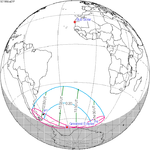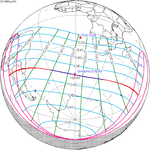Solar eclipse of December 12, 1909
Appearance
| Solar eclipse of December 12, 1909 | |
|---|---|
| Type of eclipse | |
| Nature | Partial |
| Gamma | −1.2456 |
| Magnitude | 0.5424 |
| Maximum eclipse | |
| Coordinates | 65°S 86°E / 65°S 86°E |
| Times (UTC) | |
| Greatest eclipse | 19:44:48 |
| References | |
| Saros | 150 (11 of 71) |
| Catalog # (SE5000) | 9303 |
A partial solar eclipse occurred on December 12, 1909. A solar eclipse occurs when the Moon passes between Earth and the Sun, thereby totally or partly obscuring the image of the Sun for a viewer on Earth. A partial solar eclipse occurs in the polar regions of the Earth when the center of the Moon's shadow misses the Earth. This event was visible as a partial solar eclipse across 24-hour daylight Antarctica.
Related eclipses
Solar eclipses 1906–1909
This eclipse is a member of a semester series. An eclipse in a semester series of solar eclipses repeats approximately every 177 days and 4 hours (a semester) at alternating nodes of the Moon's orbit.[1]
The partial solar eclipses on February 23, 1906 and August 20, 1906 occur in the previous lunar year eclipse set.
| Solar eclipse series sets from 1906 to 1909 | ||||||
|---|---|---|---|---|---|---|
| Ascending node | Descending node | |||||
| Saros | Map | Gamma | Saros | Map | Gamma | |
| 115 | July 21, 1906 Partial |
−1.3637 | 120 | January 14, 1907 Total |
0.8628 | |
| 125 | July 10, 1907 Annular |
−0.6313 | 130 | January 3, 1908 Total |
0.1934 | |
| 135 | June 28, 1908 Annular |
0.1389 | 140 | December 23, 1908 Hybrid |
−0.4985 | |
| 145 | June 17, 1909 Hybrid |
0.8957 | 150 | December 12, 1909 Partial |
−1.2456 | |
References
- ^ van Gent, R.H. "Solar- and Lunar-Eclipse Predictions from Antiquity to the Present". A Catalogue of Eclipse Cycles. Utrecht University. Retrieved 6 October 2018.
External links
- Earth visibility chart and eclipse statistics Eclipse Predictions by Fred Espenak, NASA/GSFC




